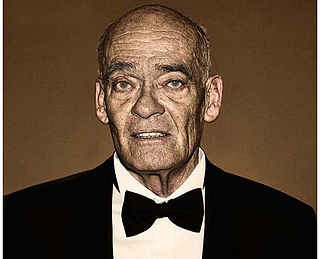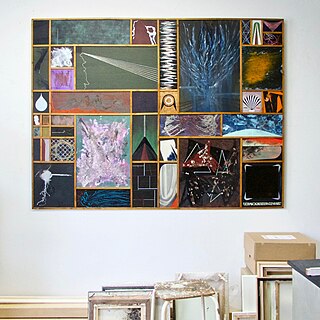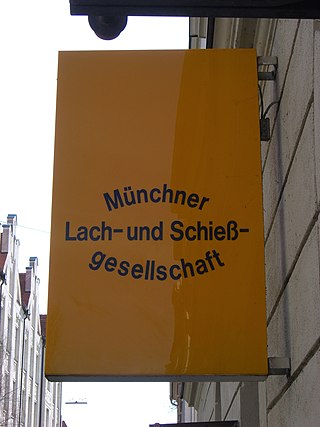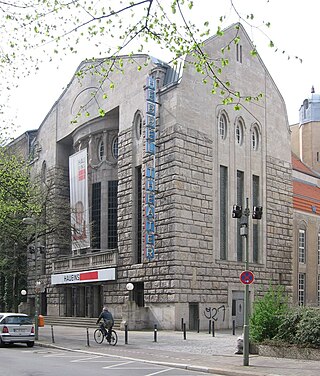
The Munich Kammerspiele is a state-funded German-language theater company based at the Schauspielhaus on Maximilianstrasse in the Bavarian capital. The company currently has three venues: the main stage of the theatre with two small stages, the workroom on Hildegardstrasse, and the Therese-Giehse-Halle in the rehearsal building on Falckenbergstrasse.
Edmund Nick was a German composer, conductor, and music writer.
Dieter Dorn is a German theatre director, also for the opera, the manager of the Münchner Kammerspiele from 1983 to 2001 and now manager of the Bavarian Staatsschauspiel.
The Hebbel am Ufer (HAU) is a theater and international performance center based in Berlin. It was founded by combining three theaters in Kreuzberg, Berlin: Hebbel Theater, Theater am Halleschen Ufer and Theater am Ufer.

Jeanette Spassova is a Bulgarian-German actress.

Angela Richter is a German–Croatian theatre director and author.

Hans-Michael Rehberg was a German actor.

Proton Theatre is an independent company based in Hungary. It was founded in 2009 and is operating according to the production concept shaped by Kornél Mundruczó and Dóra Büki. The virtual artistic group is organized around the director's independent productions.

The following outline is provided as an overview of and topical guide to Munich:

Stefan Lenhart is a German artist based in Munich. His work is a mixture of sculpture, large scale installations and painting, often incorporating historical elements.

The Münchner Lach- und Schießgesellschaft is a German political kabarett that runs at its own theatre in Schwabing, Munich. It was founded in 1956 by journalist Sammy Drechsel and comedian Dieter Hildebrandt, who were soon joined by Klaus Peter Schreiner. Walter Kabel was responsible for the show's music from 1956 to 1972, which included his own compositions.

Michaela Steiger is a German actress for theatre, film and television. Steiger was born in Garmisch-Partenkirchen and completed her acting training in New York with Susan Batson and Herbert Berghof. Her first permanent engagement was in Theater Basel where she worked under the direction of Frank Baumbauer with the directors Jossi Wieler, Andreas Kriegenburg, Frank Castorf and Barbara Frey. Then she moved to the Düsseldorfer Schauspielhaus from 1993 to 1996. She became a member of the ensemble of the Schaubühne in Berlin under director Thomas Ostermeier. Steiger had numerous guest engagements at the Hamburger Schauspielhaus, Schauspiel Frankfurt, Maxim Gorki Theater Berlin, Schauspielhaus Zürich and the Munich Kammerspiele. From 2011 to 2016 she was a member of the ensemble at the Residenztheater in Munich, where she worked with directors Martin Kušej, Katrine Wiedemann, Daniela Löffner and Bernhard Mikeska, among others. She has been associated with the Düsseldorfer Schauspielhaus since the 2016/17 season. She is also involved in various film and television productions.
André Bücker is a German theatre director and régisseur.
Ralph Hammerthaler is a German writer.
MaerzMusik is a festival of the Berliner Festspiele and has been held annually since 2002 in March at the Haus der Berliner Festspiele and other venues. It is the successor festival to the Musik-Biennale Berlin and is considered one of the most important festivals for Neue Musik in Germany. The artistic director of MaerzMusik is Kamila Metwaly.

The Hebbel-Theater is a historic theatre building for plays in Berlin-Kreuzberg, Germany. It has been a venue of the company Hebbel am Ufer (HAU) from 2003.
Annemie Vanackere is a Belgian festival curator and theatre director. Since 2012, she has been the artistic director and managing director of the Hebbel am Ufer Theatre in Berlin.

Gerhard Wolfram was a German dramaturge, theatre director and theatre artistic director.
Tanz im August is an annual festival for contemporary dance in Berlin. It was founded by Nele Hertling in West Berlin in 1988, and is now presented by the Hebbel am Ufer (HAU) theatre company on various stages in Berlin. It presents companies from all over the world with their new choreography, aesthetics and formats, new projects by Berlin artists, collaboration with international guests, and co-production for world premieres and German premieres. Virve Sutinen has been artistic director from 2014.
Bettina Masuch is a German dramaturg and theatre director as well as artistic director at the Festspielhaus St. Pölten.











